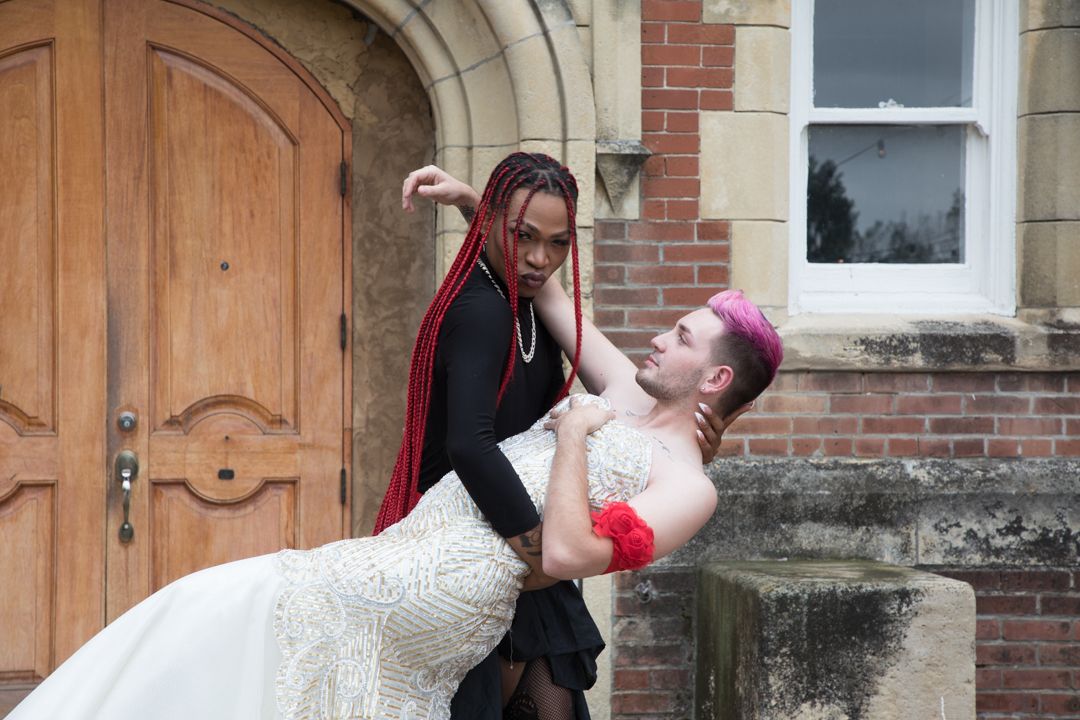There was a time when the term “same-sex” was revolutionary. And for some couples – couples who identify as the same sex as each other – it may still be a preferred descriptor. But for many, many others, “same-sex” is an assumptive, limiting title that over-simplifies or downright erases the sex identity of at least one partner.
Recently, we posted a TikTok video about the term “same-sex” specifically aimed to help other wedding industry professionals like ourselves be more inclusive allies. When we initially talked about the concept for that video, we thought it might be overly simple or obvious. After all, in a time when binaries are blasted open and complexities and nuance abound, how could we possibly still think a term as defined and rigid as “same-sex” would be widely applicable? I scrolled through my own mental rolodex and couldn’t identify more than 2 couples in my wide, beautiful queer community that might identify as “same-sex”. Though we didn’t know how much attention it might get, we pushed forward and made this little video.
And dang, did we get a response. It was thrilling to see the views climb but when we read the comments, we were surprised to see a smattering of ignorance, ego and nonchalance that just had to be addressed.
So, without further ado, we give you the top 5 reasons we don’t use the term “same-sex” without explicit permission from a couple!
1. Marginalizing or erasure of trans and nonbinary folks.
Using same-sex to address or label a couple when one or both members are trans or nonbinary erases their sexual identity and, likely, applies a binary sex to them. Not great, right?
2. Oversimplification of a complicated thing.
Sex is not static. The sex of an individual may well be evolving at any given time. What a beautiful thing! If they’re in the midst of self-discovery and boundary-laying, applying a label doesn’t respect the complex adventure they’re on.
3. Some people just plain don’t want to be referred to as their sex.
To ensure I don’t make generalizations, I’ll just speak personally here: I don’t need anyone else talking about my sex, thanks. I’m cisfemale. I identify as a dyke and queer. I consider my gender somewhat fluid. I use she/her and they/them pronouns. While I don’t believe I’m non-binary, I do itch at “female” as my prescribed sex when I think of all that means (socially, biologically, etc). Thus, I don’t use female as an identifier often and, because I consider my sex and gender exploration underway, definitely don’t like my sex being defined by the sex of my partner, as it would be if someone used the term “same-sex” to my partnership.
4. Asking is always the right answer.
Asking a couple directly how they identify and how they’d like to be referred to is your job as a professional and should be a part of your practice with all couples. Just like asking pronouns when collecting contact information, if it’s terminology you’ll use in your working relationship with them, or work in general, you need to get their consent on what labels they use. Further, these questions should be asked of every couple, not just couples you believe may be LGBTQ+. Applying the same process to all couples, regardless of sex or gender, ensures you’re not singling out perceived LGBTQ+ couples and normalizes this process with a wider audience.

5. Asking and understanding someone’s sex or gender expression is a gift.
And everyone loves presents. Every time you ask someone for their pronouns and label preferences, you are honoring and protecting their safety, comfort and identity.
In an upcoming post, we’ll dive into our favorite ways to ask your couples for their preferences.
For now, I’ll share one last thought: as wedding industry professionals, we are powerful contributors to the culture of this industry. We like to think that with every couple who gets to have the wedding of their dreams, feeling fully seen and celebrated, we’re one step further from the patriarchal, chauvinist roots of this industry that we’d all like to leave behind.
And we get a step closer to having a wedding industry that reflects the kaleidoscope that love really is.
Offbeat Wed Vendor
This page features vendors from our curated Offbeat Wed Vendor Directory. They're awesome and we love them. If you're a vendor let's get you in here!












